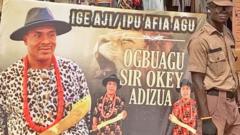In the town of Oguta, southeastern Nigeria, a deep-rooted tradition resonates with men who aspire to the title of "Leopard Slayer," or "Ogbuagu." This prestigious title, once marked by the actual hunting of leopards, has evolved into a ceremonial honor that encapsulates cultural legacy and community respect. Ken Okoroafor, a 60-year-old businessman, recently celebrated his induction, realizing a long-held childhood dream.
Historically, the title's attainment required presenting a hunted leopard to the local king, sharing its meat among 25 villages. However, conservation efforts have diminished leopard populations, leading to a shift where financial payments now stand in for the actual hunt. A key moment in this change occurred in 1942 when a grieving man was permitted to pay in lieu of delivering a leopard, setting a precedent still honored today.
The Igbuu Society governs the pathway to becoming an Ogbuagu, consisting of formal stages including the reenactment of the hunt. Recently, Zubby Ndupu commenced his journey, participating in a vibrant ceremony surrounded by community celebration. This spirit clings to adherence to tradition, with separate roles for women, who observe the rites from the sidelines.
Despite changing times, the Osbguagu title carries significant societal weight in Igbo culture, granting respect and honor. While many appreciate the cultural significance, some voices express skepticism, suggesting that resources invested in ceremonies might better serve community development. Members like Victor Aniche argue that the Igbuu Society enhances local economies through its engagements.
As both local and diaspora members maintain the meaningful connection to their heritage, the journey from dreaming of leopard hunts to gaining esteemed titles stands as a testament to Oguta's rich cultural narrative and ongoing evolution.
Historically, the title's attainment required presenting a hunted leopard to the local king, sharing its meat among 25 villages. However, conservation efforts have diminished leopard populations, leading to a shift where financial payments now stand in for the actual hunt. A key moment in this change occurred in 1942 when a grieving man was permitted to pay in lieu of delivering a leopard, setting a precedent still honored today.
The Igbuu Society governs the pathway to becoming an Ogbuagu, consisting of formal stages including the reenactment of the hunt. Recently, Zubby Ndupu commenced his journey, participating in a vibrant ceremony surrounded by community celebration. This spirit clings to adherence to tradition, with separate roles for women, who observe the rites from the sidelines.
Despite changing times, the Osbguagu title carries significant societal weight in Igbo culture, granting respect and honor. While many appreciate the cultural significance, some voices express skepticism, suggesting that resources invested in ceremonies might better serve community development. Members like Victor Aniche argue that the Igbuu Society enhances local economies through its engagements.
As both local and diaspora members maintain the meaningful connection to their heritage, the journey from dreaming of leopard hunts to gaining esteemed titles stands as a testament to Oguta's rich cultural narrative and ongoing evolution.





















